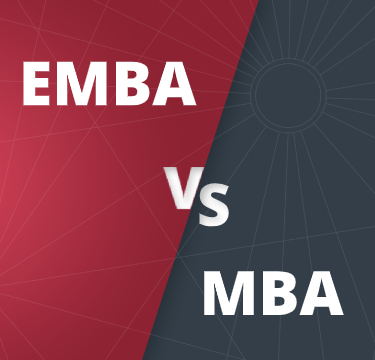



EMBA vs MBA : How to choose what is best for you? What are the differences between MBA and EMBA?
This is not an easy decision especially when you are about to begin a new chapter in your career development. Many professionals find it difficult to go back to school, so they procrastinate looking for further encouragement. When it is the right time to enter an EMBA or MBA program, you will know!
What are the disguising characteristics between an EMBA and an MBA?

Most applicants of MBA programs are aged between 24-30 whereas the typical age range for EMBA applicants is 32-42. EMBA applicants have at least 7-8 years of work experience and look for comparable experience from their classmates. MBA students have significantly fewer years of work experience.
EMBA participants mention networking as the leading reason in choosing a program. Experienced professionals derive different advantages from their networks than MBA students. They are keenly interested in developing future job opportunities in a tightly knit environment. MBAs on the other hand, look for that exceptional big jump!

EMBA literally pays for itself because it is part-time, so the participant does not incur loss of income during studies. The average post-EMBA pay raise is at least 50%.
About 53% of the EMBA students pay for their own education because they keep on earning income during their studies and many have accumulated savings. Some companies fund EMBA students when the latter use in-house data and when their research is relevant. Most MBA students pay their own way.
![]()
There are three critical components that weigh heavily on an experienced manager’s decision to enrol in an EMBA program. These are (A) CAREER EFFECT after graduation; (B) EXPERIENCES during the program and (C) the business school’s CULTURE.

Career Effect
The primary reason for executives to enrol in an EMBA program is the after effect on their career. They expect completion to significantly enhance their chances of either climbing up in the current work organization or to find a higher-placed job in another company. In either case, there is a strong expectation of increasing one’s salary!
The size and the quality of the School’s alumni network becomes extremely important in this context. It is necessary but not sufficient that the School’s admissions process is selective, which ensures that the participant will rub shoulders with those who are bright and who have excellent career prospects. The alumni network’s size and diversity, in terms of globality, gender and business backgrounds, make or break the choice on an EMBA program today.
Experiences During the Program
Will I be able to apply what I learn during the program? How intense will the interaction be among the participants? Will this be oriented towards generating innovative and creative solutions? What are the chances that I will interact with someone from an entirely different cultural or business background? How does the program manage team learning online? During the program I should have time for self-reflection. Will I be coached? The location of the EMBA program is also important. Does it reflect a modern working environment in a metropolitan city or is it on a secluded campus? Does it have access to local executives?
When I graduate, I expect to leave with (1) better leadership capability in managing mixed-gender teams, (2) more refined understanding of change management, (3) boosted self-confidence, (4) improved ability to speak and understand board-room level business language, and (5) improved ability to excite and motivate others in seeking innovative solutions.

Culture
Business schools survive and thrive on the diversity and the richness of their culture. They are not geographically constrained, they admit participants with diverse backgrounds, at least one-fifth of their intake is female, and their faculty match the diversity characteristics of their students and alumni. They are business laboratories in their society and ethics comes first. No single organization dominates their recruitment.
All of this will increase my value at work because I will have the ability to pass on my skills and knowledge to others. This is far more important than the ROI I can generate on my employer’s investments!
© 2025 Forty One North. All rights reserved.

USER AGREEMENT
1. PARTIES
This User Agreement ("Agreement"); was executed between 41 North Business School Eğitim A.Ş.
(“41 North”) who owns https://41north.com.tr/ and the mobile devices applications, and with its principal office located at Esentepe Mahallesi Büyükdere Caddesi Ferko Signature,No:175 /B4 Levent İSTANBUL and; The (“User”) who becomes a website user by accepting the following terms on the www.41 NORTH.com (“Platform”), in order to set out the conditions for the User to utilize the services provided by 41 NORTH.
41 NORTH and the User shall be hereinafter referred to as "Party" individually and "Parties" collectively.
2. DEFINITIONS
Buyer: Refers to the legal person who buys or acts with the intention to buy products or services subject to electronic trade via a platform.
Seller: Refers to the legal person launching or selling a product or service which is subject to electronic trade via a platform.
Service provider: Refers to real or legal persons operating in electronic trade.
User: Refers to the real persons who acquire “User” capacity by accepting the User Agreement, the terms of use and privacy statements at www.41north.com.tr, and who becomes a member of the website by providing their personal data, the information requested in the communication/information forms on the website with their own explicit consent, or who only visit the website and use the Platform.
Services: Refers to the applications implemented by 41 NORTH to ensure that Users perform the functions and transactions defined in the hereby User Agreement.
LPPD: Refers to The Law on Protection of Personal Data no 6698.
Personal Data: Refers to any kind of information about an identified or identifiable real person.
Processing of Personal Data: Refers to any transaction carried out with the data, such as obtaining, recording, storage, preservation, alteration, reorganization, disclosure, transfer, takeover, making available , classifying the personal data or preventing its usage by full or partly automatic means, or by non-automatic means provided that they are part of a data entry system.
3. RIGHTS AND OBLIGATIONS OF THE PARTIES
3.1. In order to obtain the User status, the User must consent to this User Agreement on the Platform, and provide correct and up-to-date the information requested by the communication/information forms contained therein and other requested and other information. User must be over 18 (eighteen) years of age. User who does not provide correct and up-to-date information when filling out the said User Agreement and forms on the Platform, is personally liable for all damage that may occur. The cancellation of the User does not imply the cancellation of the authorization for sending the commercial electronic message The User is required to separately and specifically revoke their authorization for electronic message sending.
3.2. In the case of dispute concerning the person to which the rights and liabilities of User belongs, and the persons in question submits a request with 41 NORTH in this respect, the person who made the last payment to 41 NORTH for any given Service via the relevant User account will be considered as the owner of the User account and action will be taken accordingly.
3.3. In the case where a User wishes to initiate a legal action or a purchasing process in relation to the campaigns and/or advertisements displayed on the Platform, they accept and declare that they are obliged to fulfill all legal obligations and complete all legal procedures required, including those specified on the Platform, and that 41 NORTH shall not be required to be aware of or shall not be responsible to undertake the obligations and procedures in question.
3.4. The User accepts and declares that the 41 NORTH is the seller party and he/she is the buyer party in the distant sales contracts to be executed while purchasing from 41 NORTH through the Platform; 41 NORTH accepts and declares that it is solely liable to him/her in respect of the distant sales contract, in all respects, pursuant to the Seller's applicable consumer law legislation and other legislation.
3.5. In the business model in which 41 NORTH acts as a service provider and sells its own products, the User accepts and declares that he/she is the the Buyer party and 41 NORTH is the Seller party.
3.6. 41 NORTH shall have the right to collect the price of products the User will buy from the Seller and the Buyer shall be released from its payment obligation towards the Seller once it has made such payment to 41 North
3.7. The User accepts and declares that, they will comply with the provisions in this hereby User Agreement, to the applicable legislations and to the code of ethics, with regards to the transactions and correspondence they carry out via the Platform. The civil and penal liabilities related to the User’s actions and transactions within the Platform rest solely with the User.
3.8. Pursuant to the applicable legislations, in the event of a request by the competent authorities, 41 NORTH shall be authorized to diclose the information it has, related to the User, to the authorities in question.
3.9. Personal data obtained from the User during the use of the Platform, may be transferred to other Users and/or Sellers who may be parties to a dispute concerning forgery, fraud by the User and/or Sellers, misuse of the Platform, and offenses which may constitute a crime in terms of the Turkish Criminal Law, provided that such transfer is limited to the claim and serves the purpose of enabling the parties to exercise their legal rights and limited to this scope.
3.10. The User accepts and declares in advance that the operations carried out by him/her when filling out the forms on the Platform were carried out by him/her, that the liability arising from these transactions shall rest with them , and that they will not raise any plea and/or objection alleging that they did not personally carry out these transactions and/or that they will not abstain from fulfilling their obligations in relation to this plea or objection.
3.11. The User shall not use the Platform in a manner that is contrary to law and morality, especially in the following cases.
• Using the Platform as a database on behalf of any person, to create a recording or directory, to check, update or modify;
• Using the Platform in a manner so as to disrupt it fully or partially, to alter it or use it for reverse engineering purposes;
• Carrying out transactions with false information or by using another person's information, false or misrepresented information including, residential address, electronic mail address, contact, payment or account details , incorrect or misrepresented personal data usage to create fake User accounts and the misuse of these accounts in relation to the User Agreement or applicable legislations , using another User’s account without permission, acting as another person or acting as a party or participator with an false name;
The use of comment and rating systems, for purposes which are irrelevant to the Platform such as publishing comments in places other than the Platform , or in ways that are irrelevant to its purpose such as using it to manipulate systems;
• For a virus or other harmful software to spread throughout the Platform, the Platform's database, any content on the Platform;
• For actions which will cause an overload on the technical systems and communications or harm the technical process which takes place, for “screen scraping” software or systems to be used on the Platform without 41 NORTH’s written consent, such as automatic programs, robots, web crawlers, spiders, data mining and data crawling, and for any content on the Platform, completely or partially, to be copied, published or used.
3.12. The User is responsible for carrying out transactions on the Platform without causing technical damage to 41 NORTH material and the Platform under any circumstances. The User accepts and guarantees that they have taken all the necessary precautions to protect the Platform from all kinds of harmful programs, viruses, softwares, unlicensed products, Trojans, etc., including the use of security software and licensed products.
3.13. Usage of the Platform or its contents in breach of the conditions of use specified in the hereby User Agreement or applicable legislation provisions will be deemed contrary to the law; 41 NORTH reserves the right to file lawsuits suits, bring claims and pursuance.
4. CONFIDENTIALITY AND PROTECTION OF PERSONAL DATA
4.1. Your personal data will be processed, collected, used, stored, disclosed, transferred and secured in accordance with the Law on the Protection of Personal Data No. 6698 and any other applicable data protection law by 41 NORTH.
4.2. 41 NORTH and its affiliated companies will collect information about the User's name, surname, gender, date of birth, full address, work and education status, work experience information, cv information, program preferences, e-mail address, phone number, title, city he/she resided in and his/her nationality, payment and invoicing information, internet protocol (IP) address, access date and time to the Platform, the pages he/she accesses when he/she is on the Platform, and the internet address of the website that provides a direct connection to the Platform
4.3. Personal data belonging to User will be shared with 41 NORTH business partners and cloud service providers, including 41 NORTH and its affiliated companies, third party service providers, in accordance with the following purposes.
4.4. 41 NORTH will process and store User data only for marketing and system support purposes such as sales, loyalty programs, special offers, discounts, promotions and informations about campaigns and activities, software development, to provide Users with better services , and within the framework of the legal obligation arising from the related legislation, particularly Law No. 5651 on Regulation of Publications on the Internet and Combating Crimes Committed by Means of Such Publications and related secondary legislation, Law No. 6563 on Regulation of Electronic Commerce and related secondary legislation, Turkish Criminal Code No 5237 and The Law on Protection of Personal Data No 6698; in order to fulfill its aforementioned purpose and legal obligations, based on explicit consent, taking into account the information security measures, provided that it is not used outside the scope and purpose specified in this Agreement
4.5. .41 NORTH processes the User data to ensure the fulfillment of the rights and obligations of both 41 NORTH and the User arising out of this Agreement (based on the agreement), to fulfill our legal obligations arising out of the Law on the Protection of the Consumer and Turkish Code of Obligations in connection to this Agreement, to offer discounts, opportunities, benefits in line with their preferences and likings and send commercial electronic messages upon their approval, as per Law on the Regulation of Electronic Commerce, the Turkish Commercial Code, Law No. 5651 and the Tax Procedure Law (based on the legislation), within the scope of various CRM applications used to increase user satisfaction/commitment, and transfers these data for these purposes. However, 41 NORTH accepts and declares that it will take the required measures to ensure that personal data are processed and protected in accordance with the LPPD.
4.6. 41 NORTH undertakes to take all necessary technical and other measures to protect personal data against unauthorized or illegal processing, loss, destruction or wipe out, and to establish appropriate level of security for the storage of data. 41 NORTH takes the necessary precautions and monitors the systems regularly to prevent unauthorized access to the systems in information collection, storage and processing applications. 41 NORTH restricts access to user data only to employees, contracting parties, intermediaries and other relevant parties who require strict access to this data and have a strict contractual confidentiality obligation.
4.7. Personal data processed for the purposes specified in this Agreement will be anonymized and continue to be used by 41 NORTH when the purpose for processing the data in accordance with Article 7/f.1 of Law No. 6698 ceases to exist, and when the time limits set out by the law have expired in accordance with Article 138 of the Turkish Criminal Code. The User has the right to always delete and revoke his/her consent regarding the processing and use of his/her personal data.
4.8. Pursuant to LPPD, the User has the right;
a. to know whether or not if his/her personal data have been processed.
b. to request information on the procedure, if personal data have been processed,
c. to obtain information on the purpose of processing personal data and find out whether personal data were used as fit for the purpose,
d. to obtain information about the third persons with whom personal data were shared domestically or abroad,
e. to request the correction of personal data that may have been incompletely or inaccurately processed,
f. to request the deletion or destruction of personal data in the event that the reasons for the processing of the personal data have ceased to exist.
g. to require that the above mentioned correction, deletion or destruction to be notified to the third party to whom his/her personal data is transferred, in accordance with Article 7 of the LPPD,
h. to object to the occurrence of an adverse outcome which is detrimental to him/her by the analysis of the processed data exclusively through automated systems
i. to request compensation for damages in the case where damages are sustained as a result of the illegal processing of personal data..
4.9. You can send an e-mail to kisiselverilerim@41north.com.tr from your registered email address to request that your records related to your personal data be updated/corrected/deleted in accordance with Article 11/d of the LPPD, to exercise any other rights you may have under article 11, you can send an e-mail signed with your secure electronic signature to kisiselverilerim@41north.com.tr, or you can forward a file in the form of "word or pdf.” addressed to 41 NORTH to kisiselverilerim@41north.com.tr mail address by signing with a secure e-signature, or you can apply to registered e-mail address existing on the 41 NORTH's web page with your registered e-mail address with secure electronic signature, or you can apply to the current address of 41 NORTH with a petition bearing your wet-ink signature with cargo.
5. INTELLECTUAL PROPERTY RIGHTS
The intellectual property rights of “41 NORTH” brand and logo application and Platform design, software, domain name and all kinds of trademarks, designs, logos, trade dress, slogans and other content produced by 41 NORTH which are related to these, belong to 41 NORTH. User cannot use, share, distribute, exhibit, copy or reproduce work derived from the property of 41 NORTH or its subsidiaries which are subject to intellectual property rights, without written consent. user cannot use the mobile application or the Platform, in full or partially, in another environment without the written consent of 41 NORTH. In the case where a User acts in breach of the intellectual property rights of 41 NORTH or third parties, the Member shall be obliged to compensate for the direct and indirect damage and loss of 41 NORTH and/or the third party in question.
6. AMENDMENTS TO THE AGREEMENT
41 NORTH may unilaterally amend this User Agreement and any policy, term and condition included in the Platform by means of an announcement via the Platform, provided that they comply with the applicable legislation provisions. Changing provisions in the hereby User Agreement will become valid as of the date on which they are announced on the Platform, the remaining provisions will remain valid and continue to bring about consequences.
7. FORCE MAJEURE
Events occurring beyond the control of 41 NORTH preventing the 41 North from fulfilling its obligations liabilities under the hereby User Agreement or delaying its fulfillment shall be considered as force majeure such as insurgency, embargo, government intervention, rebellion, invasion, mobilization, strike, lockout, work actions or strikes, cyber attacks, communication problems, infrastructure and internet breakdowns, system improvement and renewal work and breakdowns due to , electricity cuts, fire, explosions, storms, floods, migration, epidemics or other natural disasters , and 41 NORTH cannot be held liable for the non- fulfillment or delay in fulfilling the obligations due to Force Majeure and this situation cannot be deemed as a breach of the hereby User Agreement.
8. GENERAL PROVISIONS
8.1. User accepts that in the case of a dispute which may arise from the hereby User Agreement, 41 NORTH’s official books and commercial records and the e-archive records kept in 41 NORTH’s database and servers, electronic information and computer records will be considered as binding, crucial and exclusive evidence and that this clause will be considered as an evidential contract in terms of the 193rd clause of the Civil Courts Law no.6100.
8.2. The hereby User Agreement will be exclusively governed by the Laws of the Republic of Turkey. Istanbul Consumer Arbitration Board and Istanbul (Caglayan) Courts and Enforcement Office shall have jurisdiction over the settlement of all kinds of dispute arising from the hereby User Agreement or related to this hereby User Agreement
8.3. 41 NORTH will contact the User via the e-mail address, via telephone or by sending an / SMS, details of which were provided by the User during the membership process. The User is responsible for keeping their e-mail address and telephone number up to date.
8.4. This hereby User Agreement constitutes the entire agreement between the Parties in relation to the matter. If any term or other provision of this User Agreement is determined by a court of competent jurisdiction to be invalid, illegal or incapable of being enforced, all other terms, provisions and conditions of this User Agreement shall nevertheless remain in full force and effect.
8.5. User cannot completely or partially assign his/her rights or obligations specified in the hereby User Agreement without the prior written consent of 41 NORTH.
8.6. Failure to exercise or perform any right granted under this User Agreement by either Party shall not be construed as a waiver of such right or shall not prevent future exercise or performance of such right.
As of the 8th clause onwards, this hereby User Agreement, will enter into force as from the moment the User has read and acknowledged each provision in full and approved it in the electronic environment.